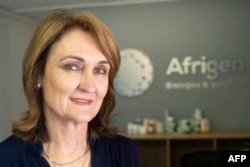

South African pharmaceutical company Afrigen is the first on the continent to make an mRNA COVID-19 vaccine using Moderna’s publicly available data. The company hopes to start clinical trials of the vaccine in November.
Afrigen is one of the companies taking part in a World Health Organization-backed hub to develop vaccines for low- and middle-income countries. Afrigen Managing Director Petro Terblanche said the mRNA vaccine was made with the company’s own knowledge base, processes and people. She said there were no technology transfers from any third party.
“The latest development at the mRNA hub at Afrigen in Cape Town is that our scientists have used the sequence of the Moderna vaccine 1273 published by Stanford University in an open-source manner and formulated a drug product at laboratory scale. They are currently doing more batches and analytical tests to make sure that they have the quality in place. So this is the first lab scale full end-to-end vaccine candidate that has been developed,” she said.

CAPE TOWN, SOUTH AFRICA — Terblanche said the company did not need permission from Moderna because its vaccine is still in the research and development stage.
“The sequence is published in the first place, secondly we are operating in the R&D space,” she said. “We have full freedom to operate, an exemption under the Bolar Exemption in IP law. So up to phase 3 clinical trials we are completely legal, and we don’t need any permission. Once that product is commercialized and there are IP constraints, we need to get a voluntary license for that.”
Terblanche said they would be asking Moderna to voluntarily license the vaccine to them, as it will be mutually beneficial to the companies and to low- and middle-income countries that will use this technology.
She added that they were using the new vaccine as a test case for a second-generation vaccine that is in the design phase.
Moderna has not commented on Afrigen’s announcement, but it was widely reported late last year that the company had paused a patent dispute with the U.S. government over its coronavirus vaccine.
Moderna had been disputing claims that three U.S. government scientists were co-inventors. However, the company said it would not pursue the fight for now, as it did not want to take attention away from battling the pandemic.
Terblanche acknowledged support from scientists in other countries for Afrigen’s work.
“This is our learning case and we’re pleasantly surprised with the results, but the design of the new formulation is already happening with the scientists and with technical partners globally,” she said. “It’s not only us, it’s a fantastic partnership with scientists in the U.S. and in Europe.”
South Africa’s acting director general of the National Health Department, Dr. Nicholas Crisp, welcomed news of the mRNA vaccine development.
“We’re very pleased to note that they’ve been picking up speed very fast in their capabilities,” he said. “It’s very exciting, it’s very important for the country. It’s one of a number of facilities that we are busy working on as a country between the department of health and science and innovation and other partners. So very encouraging.”
The World Health Organization’s regional director for Africa, Dr. Matshidiso Moeti, said 11% of the African population is fully vaccinated, and 85% have not received a single dose. She added that 239,000 people in Africa have died due to the pandemic.